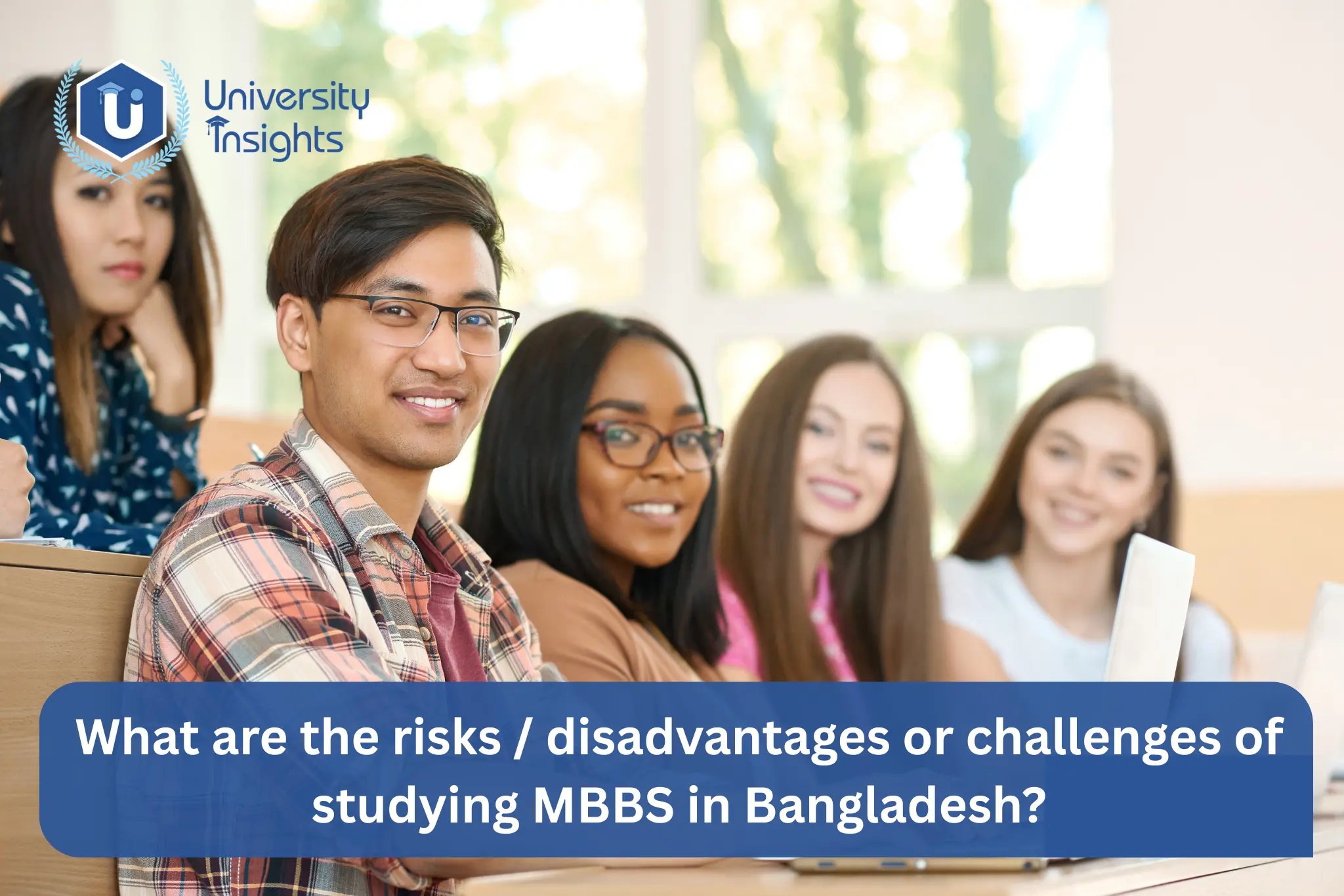What Are the Risks / Disadvantages or Challenges of Studying MBBS in Bangladesh?
What Are the Risks / Disadvantages or Challenges of Studying MBBS in Bangladesh?
Bangladesh has become a popular destination for Indian students aspiring to pursue medical education abroad. With affordable tuition fees, English-medium instruction, and cultural similarities, MBBS in Bangladesh seems like an ideal choice. However, like any international study option, it comes with its own set of risks, disadvantages, and challenges that students must evaluate before making a decision.
Understanding what are the risks / disadvantages or challenges of studying MBBS in Bangladesh helps students make informed choices, plan effectively, and avoid unexpected hurdles during their academic journey. In this comprehensive guide, we will explore these challenges in detail—ranging from infrastructure and cultural adaptation to recognition and licensing issues—and also discuss practical solutions for each.
Why Bangladesh Has Been a Preferred MBBS Destination for Indians?
Before analyzing the risks, it’s essential to understand why Bangladesh attracts thousands of Indian students every year:
-
Affordable Tuition Fees: Compared to India and other countries, Bangladesh offers quality education at reasonable costs (USD 30,000–45,000 total).
-
NMC and WHO Recognition: Many universities are recognized by the National Medical Commission (NMC) and listed in WDOMS.
-
English-Medium Instruction: MBBS courses are taught in English, making it easier for Indian students to adapt.
-
Cultural and Dietary Similarities: Food habits, festivals, and traditions are familiar to Indian students, ensuring smooth cultural adjustment.
-
Geographical Proximity: Short travel distance and low airfare make it easily accessible from India.
While these benefits make MBBS in Bangladesh appealing, every student must also weigh the potential disadvantages and challenges to ensure a realistic understanding of what to expect.
Academic and Institutional Challenges
Limited Seats in Top Colleges
The top government and reputed private colleges in Bangladesh have limited seats for international students, especially under the SAARC quota. Many students end up in lesser-known colleges with average facilities due to high competition.
Solution:
Apply early, verify NMC recognition, and seek admission only through trusted consultants who can ensure seat allocation in reputed universities.
Variation in Education Quality
While some institutions like Dhaka Medical College and Bangladesh Medical College maintain world-class standards, others may lack experienced faculty, advanced laboratories, or updated curriculum delivery.
Solution:
Check reviews, faculty qualifications, and infrastructure before admission. Prioritize universities affiliated with reputed public hospitals for better clinical exposure.
Academic Pressure and Grading System Differences
Bangladesh follows a rigid academic structure and internal exam system, which may differ from Indian evaluation patterns. Students often face high pressure to maintain consistent performance.
Solution:
Develop strong study habits early, seek guidance from seniors, and adapt to the local academic format through continuous self-assessment.
Recognition and Licensing Issues
NMC and FMGE/NExT Compliance Challenges
Although many medical colleges in Bangladesh are NMC-approved, not all maintain consistent standards for FMGE/NExT success. Some graduates face difficulties clearing licensing exams due to theoretical-heavy teaching methods and limited exposure to modern clinical practices.
Fact: The FMGE pass rate for Bangladeshi medical graduates is around 25–30%, lower than Russia or Nepal in some years.
Solution:
Choose universities with strong FMGE/NExT preparation programs. Regularly follow NMC guidelines to ensure eligibility for future practice in India.
Non-Recognition of Some Private Colleges
Not all private medical colleges in Bangladesh are listed in WDOMS or recognized by international medical councils, which can restrict global career opportunities.
Solution:
Before applying, confirm NMC, WDOMS, and BMDC recognition status through official websites. Avoid middlemen who make false claims.
Financial and Living-Related Challenges
Rising Cost of Living and Currency Fluctuation
Although tuition fees are affordable, living costs in cities like Dhaka and Chittagong have increased due to inflation and currency exchange rate changes.
Approximate Monthly Expenses:
| Expense Type | Average Monthly Cost (INR) |
|---|---|
| Accommodation | ₹8,000 – ₹12,000 |
| Food | ₹6,000 – ₹10,000 |
| Transportation | ₹2,000 – ₹3,000 |
| Miscellaneous | ₹3,000 – ₹5,000 |
Solution:
Plan your finances carefully. Keep extra funds for emergencies and monitor exchange rates while transferring money from India.
Limited Part-Time Work Opportunities
Unlike countries such as the UK or Canada, international students in Bangladesh are not allowed to work part-time, which limits their ability to earn while studying.
Solution:
Rely on scholarships or parental support. Use vacation breaks for short internships or volunteering to gain practical exposure instead.
Accommodation and Food Challenges
Some colleges provide limited hostel facilities or food options that may not meet every student’s comfort level. In smaller towns, Indian mess or familiar cuisines may not always be available.
Solution:
Choose colleges with verified hostel facilities offering Indian food. Consult current students before finalizing accommodation.
Cultural and Lifestyle Challenges
Language Barriers in Daily Life
While classes are in English, most locals and patients speak Bengali. This language gap can make clinical training and social interactions difficult.
Solution:
Learn basic Bengali phrases during the first semester. It helps in patient communication and daily life convenience.
Cultural and Gender Restrictions
Bangladesh is a conservative country, especially in smaller cities. Students—particularly females—might find certain cultural norms restrictive.
Solution:
Respect local traditions while maintaining your comfort boundaries. Stay updated on institutional policies for safety and conduct.
Administrative and Documentation Challenges
Visa Renewal and Documentation
Student visas in Bangladesh are subject to annual renewals, which can be a tedious process involving embassy visits and documentation delays.
Solution:
Keep all your academic and residence documents updated. Work with your college’s international office for smooth renewals.
Lack of Strong International Exposure
While Bangladesh provides excellent regional exposure, it lacks the multicultural diversity found in Western countries, limiting global networking opportunities.
Solution:
Participate in online medical conferences, research collaborations, or exchange programs to enhance international exposure.
Health and Safety Challenges
Healthcare and Medical Insurance Issues
International students must rely on local healthcare facilities, which may not always match international standards. Additionally, some colleges don’t provide comprehensive health insurance.
Solution:
Purchase international health insurance before departure. Keep details of nearby hospitals and emergency contacts ready.
Environmental and Infrastructure Limitations
Air pollution, traffic congestion, and unstable electricity in some cities can impact lifestyle and focus.
Solution:
Choose institutions located in well-developed areas like Dhaka or Chittagong with better infrastructure and amenities.
How the Benefits of MBBS in Bangladesh Balance the Challenges?
Despite these challenges, MBBS in Bangladesh remains a strong option for Indian students due to its affordability, curriculum alignment with India, and NMC recognition.
| Challenges | How They Are Overcome |
|---|---|
| High competition for top colleges | Apply early via verified consultancy |
| Limited global exposure | Attend international seminars & online collaborations |
| Language barriers | Learn conversational Bengali |
| Recognition issues | Verify through NMC/WDOMS before admission |
| Academic pressure | Consistent study planning & peer learning |
| Visa renewal | Stay in contact with embassy and university officials |
Facts and Statistics
-
FMGE/NExT Pass Rate (Bangladesh graduates): 25–30% (as per NBE reports).
-
Average Tuition Fee: ₹25–35 lakh for the entire MBBS course.
-
Living Cost: ₹15,000–25,000/month (depending on location).
-
NMC Approved Universities: 80+ recognized by the Bangladesh Medical and Dental Council (BMDC).
Frequently Asked Questions
1. Is it safe for Indian students to study MBBS in Bangladesh?
Yes, Bangladesh is generally safe, especially for female students. Following university safety protocols ensures security.
2. Are MBBS degrees from Bangladesh valid in India?
Yes, provided the university is recognized by NMC. Graduates must clear FMGE/NExT to practice in India.
3. What are the main disadvantages of studying MBBS in Bangladesh?
Limited seats, language barriers, high competition, and visa renewal challenges are the main drawbacks.
4. Do all Bangladeshi colleges offer good hostel facilities?
Not all. Hostel quality varies by college; always verify facilities beforehand.
5. Is the MBBS curriculum similar to India’s?
Yes. The curriculum is based on the Indian Medical Council pattern, making it easier for Indian students to adapt.
6. What is the FMGE passing rate for Bangladeshi graduates?
Around 25–30%, according to NBE data.
7. Are scholarships available for MBBS in Bangladesh?
Yes, under the SAARC quota and university-specific merit-based scholarships.
8. Do students face racism or discrimination in Bangladesh?
No significant issues are reported. Indians are generally welcomed due to cultural similarities.
9. Can students transfer to other countries mid-course?
Possible, but subject to approval from both universities and respective medical councils.
10. How can students overcome homesickness while studying in Bangladesh?
Staying in contact with family, joining Indian student associations, and participating in cultural events help ease adaptation.
Conclusion
Studying MBBS in Bangladesh is undoubtedly a practical and affordable choice for Indian students. However, it’s vital to understand what are the risks / disadvantages or challenges of studying MBBS in Bangladesh before taking the leap. From recognition issues and language barriers to administrative and cultural adjustments, each challenge can be managed effectively with proper preparation and awareness.
By selecting an NMC-approved university, learning basic Bengali, maintaining strong academics, and planning finances wisely, students can turn these challenges into opportunities for growth.





